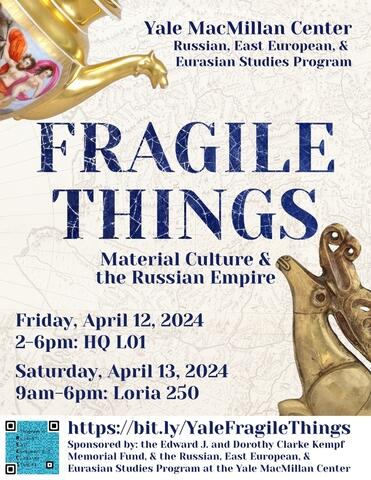April 12-13, 2024 | Yale University | New Haven, CT
This conference will be in-person.
Please note that the information below is subject to change.
For the most up to date information please visit the conference website: https://reees.macmillan.yale.edu/fragile-things-conference
In February 2022, Russian forces set ablaze the Museum of History in Ivankiv, Ukraine. Locals struggled to save paintings by the celebrated folk artist Maria Primachenko, but other collections were lost: cutlery, textiles, fossils, stamps. In the museum’s burnt-out frame, metals, fibers, and bones mixed in the self-same gray of ashy heaps. Plucked from homes, factories, and workshops, these humbler objects so redolent of nineteenth- and twentieth-century life in Ivankiv became the target of imperial erasure.
Today’s imperial violence highlights the fragility of objects like these, and urgently asks us to reconsider the frameworks by which we study the material culture of the Russian empire. How might such a landscape of endangered things resist the traditional presumptions with which we approach historical objects? In place of tactility, materiality, and presence, this conference offers a slipperier view. Objects can be hidden, stolen, destroyed. But such physical precarity belies other, intangible, mutabilities: ideologies shift, meanings elude, objects slip from our scholarly grasp. What would it mean to see material culture – and our study of it – as fragile? Fragility can be the threat of collapse or loss; it is also the gleam of volatile possibility. Where recent literary and art historical trends see matter as “vibrant” or “powerful,” this conference proposes fragility as a model and a mood for understanding the Russian empire’s things.
In the past two decades the humanities has experienced a marked “material turn,” a new materialism that has brought fresh methods and theories to the study of objects. With amplified attention not only to matter itself, but to the ideological, social, economic, political, and ecological dimensions of material objects, historians and theorists of culture have imagined the deep human and environmental networks that make, shape, and mediate things. This conference will explore these materialities as defining of the Russian empire, comprised as it was not only of matryoshka nesting dolls and Faberge eggs, but of the artistic, industrial, and religious objects of the imperial peripheries, Central Asia, the Baltic region, the Caucasus, and Ukraine. How, for example, are stories of colonial expansion or class violence retained in the crumbling relics of imperial everyday life? Can we discern shifting social and political ideologies in the migration of ornamental forms across the decorative arts? In which materials might we seek inscriptions of ecological transformation and vulnerability? And how does the researcher engage materiality when objects are lost or made inaccessible by geopolitical upheaval? In asking these and other questions, Fragile Things will attend to three main goals: to propose the concept of “fragility” as generative for material cultural scholars across a range of disciplines and methodologies; to explore the potential of new materialism to excavate previously overlooked objects, experiences, and frameworks of the Russian empire; and to leverage the framework of materiality in the project of decolonizing the study of Russia, Eastern Europe, and Eurasia.


